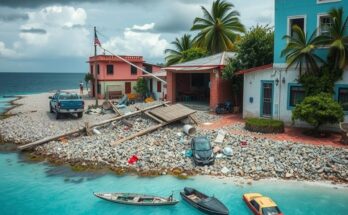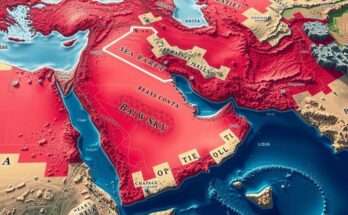Sudanese refugees are flooding into Aswan, Egypt, in search of safety and economic opportunities amidst the ongoing conflict in Sudan. This region, historically known for its gold, has seen a resurgence in mining activities due to the influx of these displaced individuals, who are leveraging their skills in gold mining to secure a livelihood. However, this boom comes with challenges, as local populations struggle with rising costs and the threat of legal repercussions for migrants.
The influx of Sudanese refugees into Aswan, Egypt, has emerged against the backdrop of the ongoing conflict in Sudan, specifically the war between the Sudanese Armed Forces and the Rapid Support Forces. Aswan, historically known for its gold, has once again become a focal point for those seeking refuge and economic opportunities, particularly in the gold mining sector. Many refugees, having previously worked in Sudan’s gold mines, arrive bearing gold and seeking both safety and financial stability. However, alongside this opportunity, they are also encountering systemic challenges such as difficulties integrating into the local economy, rising costs of living, and the threat of detention by Egyptian authorities. The war in Sudan has led to the displacement of approximately 1.2 million Sudanese to Egypt, particularly into Aswan, which is strategically located near the border and known for its rich gold deposits. While the gold trade appears to be thriving, local populations find themselves struggling to cope with rising prices and scarcity of resources driven by the influx of new arrivals renting homes and engaging in the gold trade. The environment in Aswan showcases a contrasting reality, where while some flourish in the burgeoning gold economy, others face dire economic hardships. Reports indicate a booming gold mining industry in the region, attracting individuals from various parts of Africa, including Sudan and Ethiopia. Refugees are participating in this burgeoning business, often relying on informal smuggling networks to transport themselves and their commodities across borders. This activity has brought both opportunities and risks, as authorities are also cracking down on illegal crossings and detaining refugees. As many individuals work precariously within this industrious environment, they navigate both the potential riches and repressive realities of life in Egypt’s land of gold.
The historical and cultural landscape of Aswan, Egypt, has long been tied to its significance as a center for gold mining dating back to ancient times. In contemporary context, the region has witnessed a resurgence in gold-related activities due to the influx of refugees from the neighboring war-torn Sudan. Aswan serves as both a refuge for those fleeing conflict and a hub for individuals seeking financial gain through the local gold trade. This duality has created a complex social dynamic where economic opportunities collide with local challenges, including rising living costs and the legal struggles faced by migrants seeking to establish stability amid precarious circumstances.
In summary, the narrative of Sudanese refugees in Aswan depicts a landscape of both opportunity and oppression. While many find livelihood in the thriving gold mining industry, they simultaneously confront the difficulties posed by rising costs, legal vulnerabilities, and social integration challenges. The situation underscores the dual realities of wealth generation from gold amidst the complex geopolitical and socio-economic dynamics at play, providing a poignant reflection on the life of displaced individuals in search of stability and prosperity in a foreign land.
Original Source: www.middleeasteye.net




